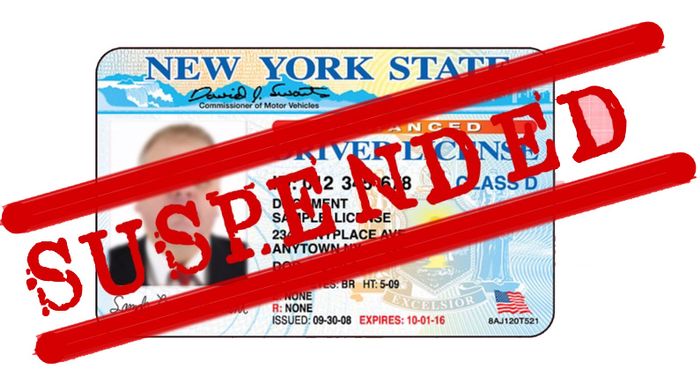On December 31, 2020, Governor Andrew C. Cuomo signed a law that dramatically helps motorists who cannot pay for their New York traffic tickets. The law called the “Driver’s License Suspension Reform Act” (also known as the Hunter-Kennedy law) (1) requires income-based payment plans to be offered for financially-strapped motorists for fines, fees, and mandatory surcharges incurred as a result of a violation of the vehicle and traffic law, (2) vests discretion in judges to reduce or waive monies owed in the interests of justice, and (3) requires additional notices be provided to motorists.
Every year, New York issues more than 1 million driver’s license suspensions for failing to appear in traffic court and/or failing to pay traffic fines, surcharges, and fees. If a person is caught driving with a suspended license (even if they need to do so to financially support themselves or others), he or she can be arrested and charged with aggravated unlicensed, a misdemeanor.
The law, called the “Driver’s License Suspension Reform Act” (also known as the Hunter-Kennedy law) is designed to address the unfairness that traffic ticket fines, surcharges, and fees imposed on individuals with limited incomes by ending the automatic issuance of driver’s license suspensions for those that cannot afford to pay their traffic ticket fines. The state’s low income and minority communities are disproportionately impacted by license suspensions. According to a study by Justice Coalition, in the last 28 months, the state of New York issued over 1.6 million suspensions related to traffic debt. The study further reveals the dire consequences that the suspensions have exacted on traffic offenders, including losing jobs, missing rent payments, and forfeiting an education because of personal and financial challenges.
Governor Cuomo explained that suspending debt-laden drivers is “a cruel and counterproductive collection practice that creates a cycle of poverty and punishment few can escape.”
Below are the details.
Payment Plans Will Be Offered
Driver’s licenses will no longer be automatically suspended for unpaid traffic ticket fines, surcharges, and fees. The new law provides that traffic court judges must offer installment payment plans for those financially in need of this relief. There is no charge to participate in a payment plan. Prior to this law, in New York City, motorists were given 2 weeks to pay their fines, surcharges, and fees (and could seek a second 2-week period) but, thereafter, were automatically suspended.
The payment plans shall require monthly payments that do not exceed 2% of a driver’s monthly net income or $10.00, which is greater. For purposes of this law “net income” means such a person’s total income from all sources and assets, minus deductions required by law (such as support payments and wage garnishments).
In practice, motorists seeking a payment plan may be required to complete a financial disclosure report on a DMV form. The traffic court judge can require a motorist to return to court once a year to allow the court to re-assess that motorist’s financial condition. The re-assessment could lead to an adjustment to the plan. Similarly, motorists can petition traffic court for a reduction if their circumstances change. As long as a motorist adheres to the payment plan, no further action can be taken against his or her driver’s license.
Traffic Court Judges Can Reduce Or Waive Fines, Surcharges, And Fees
In addition to the possibility of obtaining a payment plan, the new law vests discretion in judges to reduce or waive monies owed in the “interests of justice”. The phrase is not defined in the law but presumably will be interpreted to mean when a motorist’s financial situation warrants. It is unclear how traffic court judges will exercise this discretion but it cannot hurt for a New York motorist to bring proof to traffic court that he or she cannot afford to pay a hefty amount.
Additional Notification
Finally, the new law requires that traffic courts notify motorists of their right to seek a payment plan at the time the traffic ticket is issued, at the time of sentencing, and communications concerning the imposition or collection of a fine, fee, or surcharge. Interestingly, the law does not require that a motorist be informed of the traffic court’s discretion to lower or waive fines, surcharges, and fees.
Additional Information
How about if you are currently suspended? We recommend that you seek to reinstate your license and request a payment plan. The law allows for such relief.
What does the new bill hope to achieve?
For a long time, traffic debt suspension has forced an impossible choice for New York drivers who are torn between stop driving and lose a source of income or keep driving and risk criminal charges. The bill hopes to achieve the following:
- Reduce discrimination. The low income and minority communities are the most affected by the driver’s license suspensions. Because most of these low-income people cannot afford to retain a traffic lawyer and/or pay hefty fines and surcharges, their licenses are suspended. However, the new bill seeks to address this discrimination and enhance fairness and equality.
- Break the cycle of debt and poverty. The bill’s proponents hope to end the vicious cycle of poverty and punishment that the suspensions visit on individuals and families from impoverished backgrounds. Once licenses are suspended, most of the disadvantaged persons lose their source of income. Consequently, families continue to struggle to make ends meet.
- Reduce the criminalization of poverty. The state’s legal system has criminalized poverty by criminally charging those who cannot afford to pay traffic ticket fines and fees and decide to drive anyway.
- Make The Roads Safer. Data available from The National Highway Traffic Safety Administration reveals that 75 percent of individuals with suspended licenses risk-taking to the road anyway because they do not have a better means of getting around. Most drivers fearing hefty fines and jail terms may resort to fleeing when law enforcers stop them. This results in dangerous car chases that pose safety risks to road users.
- Enable better response to COVID-19. As the coronavirus rages on, individuals need to have their licenses to help them respond better to medical emergencies. The passage of the reform act will enable New Yorkers to safely attend to their chores, jobs, and medical appointments without risking their lives and others because they will be driving their cars rather than using taxis or public transport means.
Frequently Asked Questions
Is the Driver’s License Suspension Reform Act Exclusive to New York State?
In the last 24 months, several states and cities across the country have enacted legislation that is similar to New York’s new law.
Do I still need a traffic lawyer if I get caught up with traffic offenses in New York?
MAYBE. We recommend that you consult with us if you get a New York moving violation. Our lawyers will fight any type of moving violation issued anywhere in New York State. The consultation is always free.
The following are the other reasons you need to have the traffic lawyers on speed dial if you drive in NYC:
- Help you understand the traffic laws. Traffic laws can be a challenge to grasp. When you violate a traffic law, your NY traffic attorney will research the specific law and its potential consequences. Our lawyers have a wealth of experience defending traffic offenders and an in-depth understanding of the applicable laws.
- Lower tickets or dismissal. The lawyer will contest wrongly issued tickets and explain your circumstances in a traffic court, to try and convince the judge to lower the penalty or dismiss the charge. If the penalty is dismissed, you avoid accumulating points on your driving license altogether.
If you are driving within New York and need a traffic attorney, call Weiss & Associates, PC at 212-683-7373. We will help you navigate the tricky traffic offenses laws and do our best to ensure that you come out unscathed. Our attorneys come with a wealth of experience and in-depth knowledge of traffic rules to competently handle any traffic charges on your behalf.
We fight any traffic ticket issued anywhere in New York, including speeding tickets, truck tickets, and suspensions. We remain open despite COVID-19.
Contact us at 212-683-7373 or text the front of your ticket to 516-558-5586, and let’s discuss your legal options.

